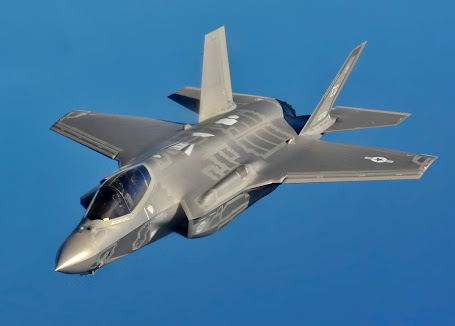Farhad Manjoo is a New York Times columnist. On January 13, 2022, his column in The Times was titled as follows, online: "We Must Stop Showering The Military With Money."
I saw Manjoo's column on January 16th, reprinted in the San Jose Mercury. The title there, in the hard-copy edition, read this way: "PENTAGON OVERSPENDING - U.S. has far too many challenges to spend so much on the military."
Manjoo's column featured a discussion of what he called a $1 trillion dollar boondoggle/warplane, pictured above, the Lockheed Martin F-35.
There is an economic principle not explicitly mentioned in Manjoo's column, but the whole column is all about that principle. It is called, "Opportunity Cost."
What Is Opportunity Cost?Opportunity costs represent the potential benefits an individual, investor, or business misses out on when choosing one alternative over another. Because opportunity costs are, by definition, unseen, they can be easily overlooked. Understanding the potential missed opportunities when a business or individual chooses one investment over another allows for better decision-making.
Manjoo's point is that the people of the United States are "missing out" on many, many benefits by spending so much money on the military. As you may remember, if you have been following the news out of Congress, Congress has been unwilling to invest money in various kinds of social benefits (they cost too much says Mr. Manchin) while actually increasing the military budget, beyond what the President initially proposed.
I would like to suggest two other ways of looking at the issues raised by Manjoo's column. Let's consider the following phrase:
This well-known statement suggests that any person who wants to be taken seriously, as she or he discusses what's most important in life, needs to be able to demonstrate that the person's allocation of her or his scarce economic resources is an accurate reflection of her or his stated policy priorities.
In politics, we utilize this phrase to evaluate whether political actions reflect a politician's hypocrisy and/or lack of political courage (let's not forget to mention Kyrsten Sinema right here).
Then, just to finish up my report on thoughts spurred by Manjoo's column, let's consider reversing the "put your money where your mouth is" phrase. Significant insights can sometimes be obtained by reversing a descriptive statement, to see if something new has been revealed. So, let's think about this phrasing:
Put Your Mouth Where Your Money Is
I think, in fact, that it is a significant truth that we all tend to justify our own actions, and in the political context, since the United States of America spends such a huge percentage of its annual income on past, present, and future military actions, we tend to say (and believe) that these expenditures reflect valid and extremely important public purposes.
But is that actually true, or is it an example of the "put your mouth where your money is" phenomenon?
I am thinking that Farhad Manjoo is right, and that "showering the military with money" is not as high a priority as we seem to think, when we look at how we allocate our resources.
Here's what I say:
Let's Consider The "Opportunity Cost!"
Image Credit:
https://en.wikipedia.org/wiki/Lockheed_Martin_F-35_Lightning_II


No comments:
Post a Comment
Thanks for your comment!